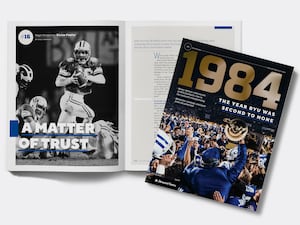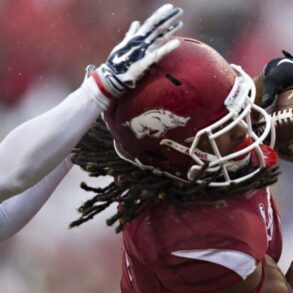Steve Young believes the trajectory his NFL career was changed by a single conversation on a flight in the middle of his lowest moment.
During an appearance on the “Glue Guys” podcast in October that Young reshared on X on Sunday, the Hall of Fame quarterback described that conversation, which he said helped him see how a victim mindset was holding him back.
“You have to define stuff in the proper way or else you’ll play the victim and waste sometimes your life in the bottom of a hole that you thought someone else dug and threw you in. I dug it myself by hand and jumped in,” he said.

Special Collector’s Issue: “1984: The Year BYU was Second to None”
Get an inclusive look inside BYU Football’s 1984 National Championship season.
After a 6-12 loss to the Raiders in which Young threw two interceptions “in front of 100,000 people in the (Los Angeles Memorial) Coliseum,” Young felt like he had to get out of town. So, he did.
How Stephen Covey helped Steve Young turn his NFL career around
On his flight back to San Francisco, Young met author and speaker Stephen Covey. Their conversation changed Young’s career, the quarterback said.
“I told him how terrible my life was,” he said. “He said something that was amazing to me. He said, ‘Steve, I travel the world looking for platforms, places, businesses, family offices, places where they allow the humans that are on the platform the chance to iterate and find out how good they are. And when I see those qualities, I put them in books.”
He then told Young that with Bill Walsh as his coach and Joe Montana as a mentor, Young had “the greatest platform I’ve ever seen for any human.”
What Steve Young learned from Stephen Covey
Covey encouraged Young to “go find out how good you are. Like, this is the greatest opportunity ever.”
“Him saying that, honestly, it was as if I was in a trance and he snapped his fingers, and I was like, ‘Oh my gosh. What am I doing?’” Young said.
The former BYU quarterback “raced back to practice the next morning,” thinking he would be fired for his performance.
“I didn’t realize at the time that I was the one that dug the hole. I was the one that was playing the victim. I was the one that blamed it on everyone else. But I was almost depressed and anxiety-ridden because I had misdiagnosed the situation and found the death in it, rather than that profit in it. He snapped me out of it and all of a sudden, I saw nothing but opportunity,” he said.
After his conversation with Covey, Young realized that he “screwed it up,” so he fixed the situation, he said on the podcast. Young said he never asked about Montana’s future with the 49ers again.
“It wasn’t the thing. The question was, ‘How good can you be and go be about it and let’s go.’ That’s when things turned for me in the middle of 1991,” he said.
Young went on to win MVP the next season in 1992 and barely missed out on the award in 1993 before winning it again in 1994.
“I won it again because I was on a quest. The whole thing flipped in a more positive way where I could put everything that was happening in context that was profit. Now Joe became a mentor. If you start to play victim, you will not get there,” Young said.
This post was originally published on this site be sure to check out more of their content.




